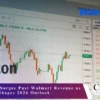Bendigo and Adelaide Bank (ASX: BEN) finds itself in regulatory crosshairs after an independent review uncovered widespread failures in anti-money laundering controls.
The regional lender’s share price plummeted 8% to $10.11 on 25 November 2025, wiping hundreds of millions in market value. Investors fled after Deloitte’s investigation revealed systemic deficiencies spanning six years.
Investigation Uncovers Systemic Failures
What began as a single-branch inquiry has mushroomed into something far worse. Bendigo Bank commissioned Deloitte in August 2025 after identifying suspicious activity at one location.
The review examined transactions between 1 August 2019 and 1 August 2025. Investigators found money laundering risks that stretched across the entire organisation.
Deloitte concluded deficiencies existed in the bank’s approach to identifying, mitigating and managing money laundering and terrorism financing risks. The problems weren’t isolated to one branch. They permeated key systems bank-wide.

Bendigo Bank headquarters in Bendigo
The review exposed weaknesses in multiple critical areas. Customer due diligence processes failed to meet regulatory standards. Transaction monitoring systems contained major gaps. Risk assessment methodologies proved inadequate. Customer risk rating approaches didn’t comply with requirements.
Deloitte’s report highlighted deficiencies extending beyond the single branch, encompassing areas such as risk assessment methodologies, customer due diligence processes, and inadequate coverage of numerous money laundering and terrorism financing risk indicators within the bank’s transaction monitoring program.
Share Price Crashes as Uncertainty Mounts
Market reaction was swift and brutal. Bendigo Bank shares had closed at $11 the previous day. By Tuesday lunchtime, they had crashed to $10.11.
The 8% decline made the bank the worst performer on the ASX 200 that session. The stock has now lost 22.6% year-to-date in 2025, significantly underperforming the broader ASX banking sector.
Trading volumes spiked as investors dumped holdings. The sell-off reflected deep concerns about potential regulatory penalties and remediation costs.
Costly Remediation Programme Ahead
The financial impact remains uncertain. Bendigo Bank admitted it doesn’t know the final costs.
Macquarie analysts estimated the bill could reach between $30 million and $70 million. That represents 4-10% of the bank’s annual profits, a significant hit for a regional lender.
For context, Bendigo Bank posted cash profit of $514.6 million for the 12 months ending 30 June 2025. Profit fell 8.4% as competitive pressures squeezed margins.
Citi maintained its sell rating on the stock. The broker warned investors face prolonged uncertainty until management provides detailed remediation plans. Citi noted that investment and compliance pressures will persist for Bendigo Bank and the sector.
Historical Precedents Paint Grim Picture
Australian banks have faced massive penalties for anti-money laundering failures before. The stakes are enormous.
Westpac copped a record $1.3 billion fine in 2020 for over 23 million breaches. The scandal forced the resignation of both CEO and chairman. Commonwealth Bank paid $700 million in 2018 for 53,500 reporting failures.
AUSTRAC CEO Nicole Rose stated the Westpac outcome sends a strong statement to financial sectors that they must take their obligations seriously or significant penalties will be applied.
Bendigo Bank’s situation differs in scale but raises similar red flags. The six-year timeframe suggests persistent compliance gaps. AUSTRAC has demonstrated willingness to impose heavy penalties on banks that fail their obligations.
Board Admits Disappointment, Promises Action
The bank’s board expressed strong disappointment with Deloitte’s findings. They committed to fully funding an uplift programme addressing all identified deficiencies.
The board stated it is fully committed to ensuring the bank undertakes necessary enhancements to its systems, processes and frameworks to ensure full compliance with obligations under the Anti-Money Laundering and Counter-Terrorism Financing Act 2006.
Management pledged ongoing collaboration with regulators. AUSTRAC, APRA and ASIC will all scrutinise the bank’s remediation efforts.
The regional lender faces a critical test. It must demonstrate capability to fix fundamental compliance failures while maintaining profitability.
Investor Day Timing Adds Pressure
Bendigo Bank had scheduled an investor day for next week. The timing couldn’t be worse.
Citi expects the investor day may be too early for management to put definitive numbers around an uplift program, potentially complicating the messaging. Productivity improvements represent a key pillar of the bank’s strategy to improve returns.
Now those plans face the shadow of compliance costs. Investors want clarity on remediation expenses and timeframes.
Broader Sector Implications
Bendigo Bank’s troubles highlight persistent challenges across Australian banking. The sector has struggled with anti-money laundering compliance despite repeated regulatory actions.
Citi added that the broader banking sector has a poor track record on anti-money laundering and suspicious transaction reporting obligations.
Regional banks face particular pressure. They lack the resources of major banks like Commonwealth Bank but face identical regulatory requirements.
What Happens Next
Bendigo Bank must now navigate treacherous waters. The remediation programme will consume management attention and capital. Regulatory scrutiny will intensify.
The bank committed to keeping the market informed about costs and progress. Final outcomes remain unknown at this stage.

AUSTRAC could impose substantial penalties depending on investigation findings. The regulator has shown no hesitation in pursuing major enforcement actions against non-compliant institutions.
For investors, the uncertainty creates a challenging environment. The stock trades at depressed valuations but carries significant downside risk until the situation clarifies.












